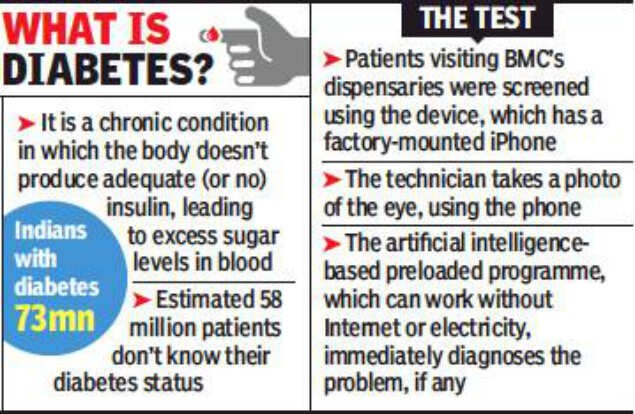- Health IT
- 2 min read
BMC study helps detect diabetic blindness easily
Doctors feel the device, which has a pre-mounted iPhone containing an AI programme that works without internet, could be of help in rural areas.MUMBAI: A study done in the BMC’s dispensaries with a smartphone camera has shown that artificial intelligence (AI) can accurately diagnose diabetic retinopathy, the second leading cause for blindness in India.

Doctors feel the device, which has a pre-mounted iPhone containing an AI programme that works without internet, could be of help in rural areas. “The device, operated by a semi-skilled worker, showed 100% accuracy, compared with an ophthalmologist’s diagnosis,’’ said Dr S Natrajan of Aditya Jyot Foundation, which conducted the study.
There is only one ophthalmologist for every 15,000 Indians, making diagnosis of diabetic retinopathy more difficult.
After the pilot study, the foundation tied up with Tata Trusts to continue retinopathy screening at BMC dispensaries. At present, 1,688 patients have been screened and 117 have been diagnosed with diabetic retinopathy. “Results of 144 patients were not clear as they also had cataract. They have been referred for further tests,’’ said Dr Natrajan.
The device and AI programme have been developed by Bengaluru company, Remidio Innovative Solutions. “We started work on the product almost a decade back. The idea was to make low-cost devices, easier to use than existing ones,’’ said Anand Sivaraman of Remidio. The device costs Rs 3 lakh and AI costs can be recovered by charging each patient Rs50 a scan.
Dr Astha Jain of foundation said most patients diagnosed with diabetic retinopathy in the study did not know they had diabetes. “When we ask patients with diabetes why they had not got their eyes tested before, they say they either did not know or did not get an appointment,’’ she added.
T Y Alvin Lie from Johns Hospitals Bloomberg School of Public Health wrote an editorial in JAMA Ophthalmology, saying the study was “pathbreaking’’. He wrote that “by embedding the screening algorithm into smartphones, the authors have pioneered a way to bring DR (diabetic retinopathy) screening to patients at risk instead of relying on patients to come to point of care to be screened. This paradigm-shifting approach to DR screening could greatly benefit rural populations in developing and developed countries, where access to care is limited.’’



COMMENTS
All Comments
By commenting, you agree to the Prohibited Content Policy
PostBy commenting, you agree to the Prohibited Content Policy
PostFind this Comment Offensive?
Choose your reason below and click on the submit button. This will alert our moderators to take actions